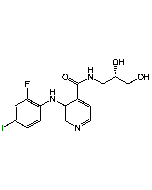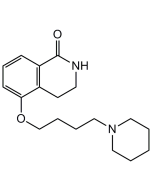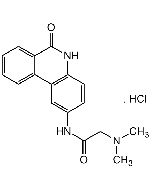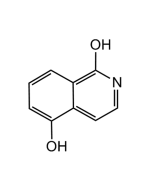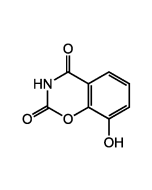Cookie Policy: This site uses cookies to improve your experience. You can find out more about our use of cookies in our Privacy Policy. By continuing to browse this site you agree to our use of cookies.
AdipoGen Life Sciences
RBN-2397
As low as
145
CHF
CHF 145.00
In stock
Only %1 left
AG-CR1-3547-M0055 mgCHF 145.00
AG-CR1-3547-M02525 mgCHF 580.00
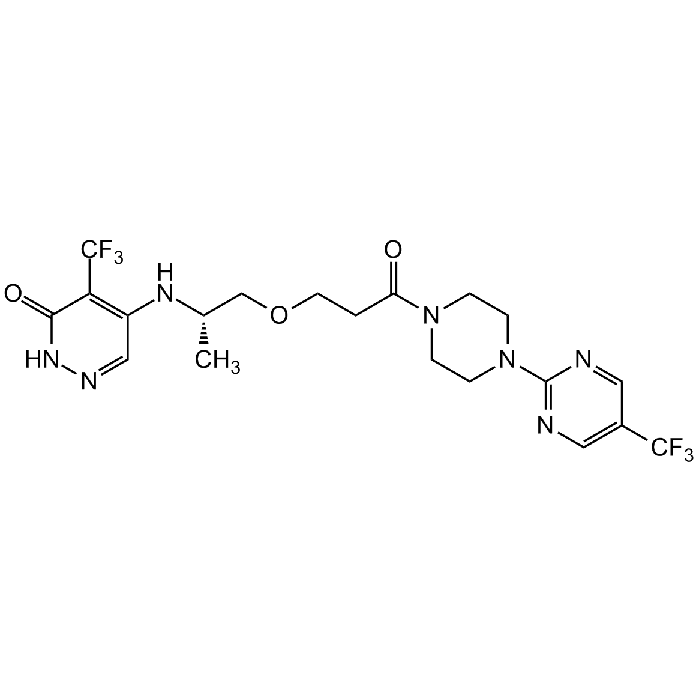
| Product Details | |
|---|---|
| Synonyms | Atamparib; 5-[[(1S)-1-Methyl-2-[3-oxo-3-[4-[5-(trifluoromethyl)-2-pyrimidinyl]-1-piperazinyl]propoxy]ethyl]amino]-4-(trifluoromethyl)-3(2H)-pyridazinone |
| Product Type | Chemical |
| Properties | |
| Formula |
C20H23F6N7O3 |
| MW | 523.4 |
| CAS | 2381037-82-5 |
| Purity Chemicals | ≥95% |
| Appearance | White to off-white solid. |
| Solubility | Soluble in DMSO (10mg/ml) or DMF (1mg/ml). Insoluble in water. |
| Identity | Determined by 1H-NMR |
| InChi Key | UQZCQKXJAXKZQH-LBPRGKRZSA-N |
| Smiles | O=C1NN=CC(N[C@@H](C)COCCC(N2CCN(C3=NC=C(C(F)(F)F)C=N3)CC2)=O)=C1C(F)(F)F |
| Shipping and Handling | |
| Shipping | AMBIENT |
| Short Term Storage | +4°C |
| Long Term Storage | -20°C |
| Handling Advice |
Keep cool and dry. Protect from moisture. |
| Use/Stability | Stable for at least 2 years after receipt when stored at -20°C. |
| Documents | |
| MSDS |
 Download PDF Download PDF |
| Product Specification Sheet | |
| Datasheet |
 Download PDF Download PDF |
Description
- RBN-2397 is a potent NAD+ competitive small molecule inhibitor of PARP-7. RBN-2397 selectively inhibits PARP-7 and demonstrates >50-fold selectivity for inhibition of PARP-7 over all PARP family members as measured by biochemical assays. RBN-2397 inhibits PARP-7-dependent MARylation (IC50 = 2nM) in cell biochemical assay and inhibits cells proliferation in NCI-H1373 lung cancer cells (IC50 = 20nM). By selectively inhibiting PARP-7 in tumor cells, RBN-2397 has been shown to directly inhibit cellular proliferation and restore Type I interferon signaling to stimulate an innate and adaptive antitumor immune response.
- Targeting cytosolic nucleic acid sensing pathways and the Type I interferon (IFN) response is an emerging therapeutic strategy being explored in oncology. The PARP family consists of seventeen enzymes that regulate fundamental biological processes including response to cellular stress. Normal cells do not express high levels of PARP-7. PARP-7 is upregulated in response to cellular stress, including exposure to toxins in cigarette smoke, steroid hormones and during viral infection. PARP-7 (TIPARP) is a monoPARP that catalyzes the transfer of single units of ADP-ribose onto substrates (MARylation) to change their function and plays a role in suppressing the Type I IFN response. PARP-7 serves as a brake in cancer cells to block the production of Type I interferons and suppress the normal cellular stress response. Thus, the expression of PARP-7 enables cancer cells to escape senescence or the loss of a cell’s ability to divide and avoid immune detection and subsequent elimination.
Product References
- PARP7 negatively regulates the type I interferon response in cancer cells and its inhibition triggers antitumor immunity: J.M. Gozgit, et al.; Cancer Cell 39, 1214 (2021)






